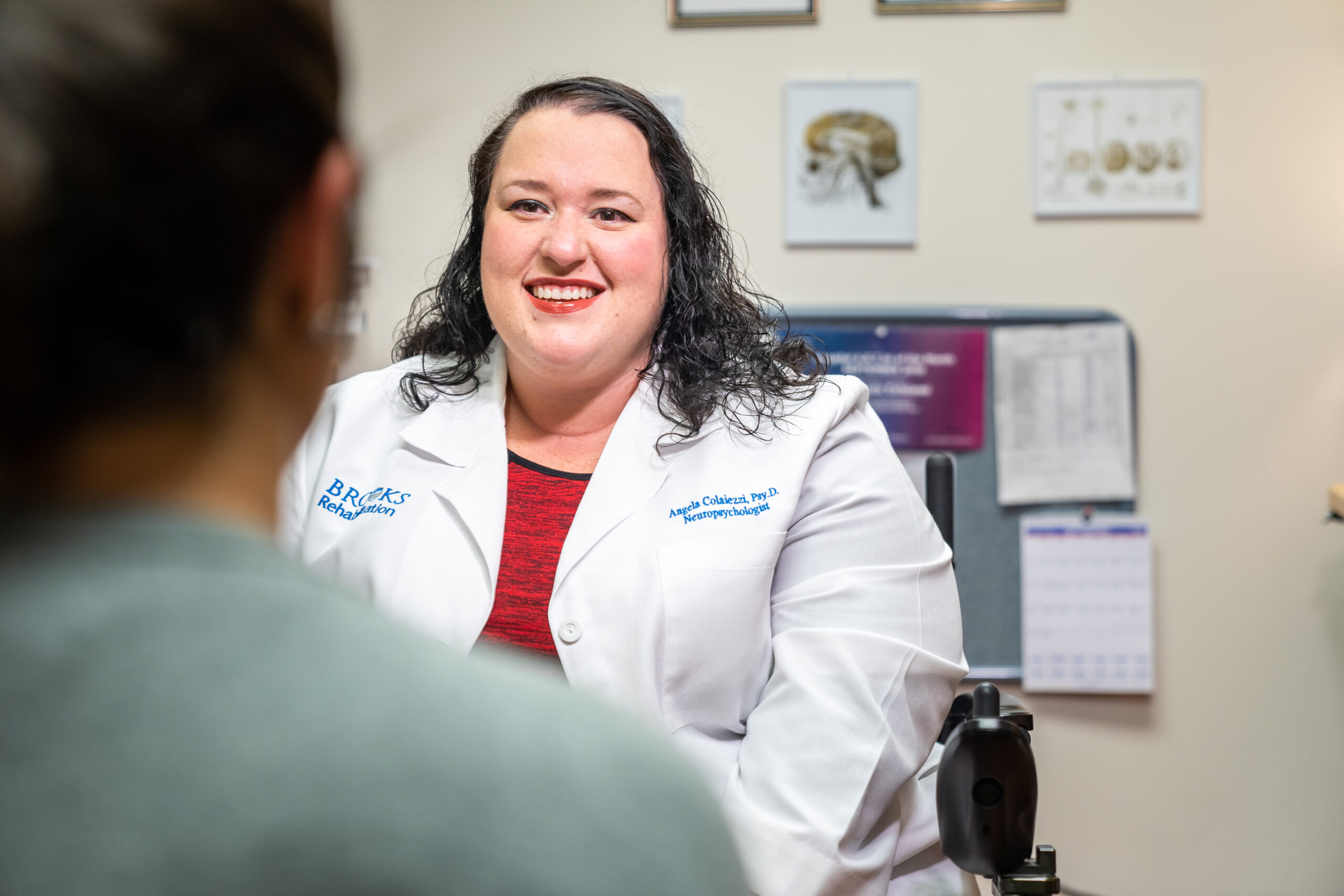What is neuropsychology?
Neuropsychology is a specialized field within psychology dedicated to understanding the relationships between the brain and behavior. A neuropsychologist is a licensed psychologist trained to assess cognitive, emotional, and behavioral functioning. The neuropsychologist and the patient use this information to develop a treatment plan that best fits the patient’s need. Brooks Rehabilitation neuropsychologists work with children, adolescents, and adults in both the inpatient hospital and outpatient settings.
What is a neuropsychological evaluation?
The neuropsychological evaluation is tailored to address the patient’s specific concerns about functioning, and typically includes:
- Interview with the patient and possibly family members or caregivers
- Assessment and testing (typically one-on-one tests of thinking using paper/pencil or computer tests)
- Feedback session to review results and recommendations
- Full written report upon completion
Patients who may benefit from a neuropsychological evaluation include those with:
- A known neurological disorder, such as epilepsy, Parkinson’s disease, multiple sclerosis, or dementia
- An acquired brain injury from concussion or more severe head trauma, stroke, brain tumor, or brain infection
- Other medical conditions that may affect brain functioning, such as chronic heart, lung, or kidney problems, or autoimmune diseases
- A neurodevelopmental disorder such as cerebral palsy or spina bifida
- Problems or changes in thinking, memory, or behavior with no clear known cause
What are the goals?
The goals of a neuropsychological evaluation can include:
- Make or inform a diagnosis: Results of a neuropsychological evaluation can help understand the reason a patient may be having problems with their functioning. For example, evaluation results can help sort out if cognitive changes are related to normal aging, or neurologic illness, mood changes, or other factors.
- Determine strengths and weaknesses: After a neurological injury, such as a stroke or brain injury, a neuropsychological evaluation can help understand what cognitive skills have changed and the degree to which they have changed. This may also be helpful if you have a neurologic illness, such as multiple sclerosis, Parkinson’s disease, or epilepsy.
- Provide guidance for treatment: The results of a neuropsychological evaluation can help to inform treatment strategies, such as strengths that can compensate for weaknesses. Recommendations related to adjustments for home, school, and work responsibilities may also be made.
How long do evaluations take?
The amount of time needed to complete a neuropsychological evaluation varies based on the nature and reason for the evaluation. Depending on the reason for evaluation, testing can take anywhere from one to eight hours, with three to four hours being the most typical length of time. Patients are able to take some breaks during testing, depending on how they are feeling and the length of the testing.
Who performs these tests?
Clinical neuropsychologists conduct neuropsychological evaluations with the assistance of psychometrists, who are trained to administer and score neuropsychological tests.
How can I prepare for my neuropsychological evaluation?
Unlike other types of testing you may have encountered in your life, there is no way to study or train for a neuropsychological evaluation. Instead, the most important thing you can do is make sure you are well rested and prepared to be at your appointment for several hours.
This means you should get a good night’s sleep the night before your evaluation and try to eat a good breakfast. Typically, you should take all of your medications as usual, unless directly told to do otherwise. Make sure you bring your glasses and hearing aids, if you use these things in your day-to-day life.
If you have previously had neuropsychological or academic testing, it can also be helpful to bring those records.
What happens after the evaluation?
When your evaluation is complete, a report is typically prepared within two weeks of your appointment. You may then meet with your clinical neuropsychologist to discuss the results of your testing. This discussion may include recommendations for treatment and strategies to use in your day-to-day life. You may also meet with the provider who referred you for the evaluation to discuss your results.
Where can I receive a neuropsychological evaluation?
Neuropsychological evaluations are conducted in person at Brooks Behavioral Medicine, and telehealth services are also available.
What do neuropsychology services look like in Brooks Rehabilitation Hospital?
When patients are admitted to Brooks Rehabilitation Hospital, their physician, other members of their rehab team, or their family may request neuropsychology services. The inpatient neuropsychologist may then provide assessment and intervention services to understand how a patient’s cognitive, emotional, and behavioral functioning may be impacting their recovery. This may include recommendations to the patient, their caregivers, and the treatment team to better help their rehab process as well as to make decisions about their discharge. It may also be recommended that a patient receive neuropsychological services following their discharge from the hospital setting through Brooks Behavioral Medicine, located at the Brooks Southside Clinic location.
Connect with us
During a course of inpatient care at Brooks Rehabilitation Hospital, patients and families can request Inpatient Neuropsychology services from the patient’s treatment team.
A referring physician must make referrals for outpatient neuropsychological evaluations through Brooks Behavioral Medicine. For additional questions, call: (904) 345-7210.
